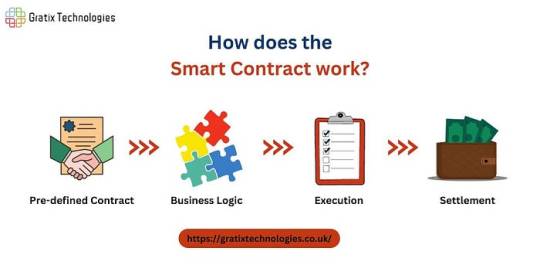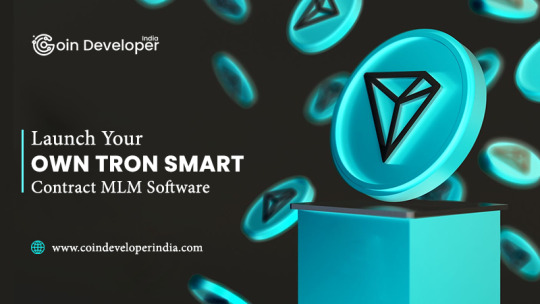#smart contract software
Explore tagged Tumblr posts
Text
Smart Contract and Blockchain Development Services | Hire Expert Smart Contract Blockchain Developers
As a leading provider of smart contract and blockchain development services, we specialize in creating secure, automated solutions that enhance transparency and efficiency. Our team of expert developers is dedicated to delivering cutting-edge blockchain technology to help businesses streamline operations and ensure trust in every transaction. Hire our skilled professionals to implement robust solutions tailored to your needs.

#smart contract blockchain#blockchain smart contract developer#smart contract api#smart contract integration#smart contract#smart contract development#smart contract development company#smart contract in blockchain#smart contract developer#smart contract development agency#smart contract company#smart contract developers#smart contract service#blockchain smart contract development agency#blockchain smart contract development company#best smart contract development company#hire smart contract developer#smart contract companies#hire smart contract developers#hire blockchain smart contract developer#smart contract consulting#smart contract software
1 note
·
View note
Text
Start-Ups Partner
Partnering with startups can be a game-changer for established businesses. By collaborating with innovative and agile firms, established companies can tap into new technologies, markets, and talent pools. Such partnerships allow both parties to leverage their strengths, drive growth, and stay ahead of the competition. Whether it's a strategic investment, a joint venture, or a simple referral agreement, startups and established companies can work together to build a brighter future.
#start up partner#software developers#blockchain#smart contracts#seo services#reactnative#flutter app development
3 notes
·
View notes
Text
Decoding Smart Contracts: Streamline Blockchain Automation

Say goodbye to endless paperwork and slow processes. Imagine contracts that fulfill themselves, tasks that flow without a hitch, and trust that’s written in code. Smart contracts promise a world where transactions are seamless, transparent, and secure. They’re the quiet revolutionaries of the digital age, turning complex agreements into effortless harmony. Discover how this powerful technology can transform your business and bring a new rhythm to your operations.
#blockchain#software development#future technology#information technology#smart contracts#cybersecurity#businesssolutions#technews
0 notes
Text
Leading the Charge in Smart Contract Development at Dunitech Soft Solutions

At Dunitech Soft Solutions, we specialize in smart contract development, creating robust and secure blockchain solutions that automate and streamline processes across various industries. Our expert team leverages cutting-edge programming languages and platforms, such as Solidity on Ethereum, to design and deploy smart contracts tailored to our clients’ unique needs. By ensuring transparency, efficiency, and trust, our smart contracts facilitate everything from decentralized finance applications to supply chain management. Committed to rigorous testing and security audits, we empower businesses to harness the full potential of blockchain technology while minimizing risks. With Dunitech Soft Solutions, you can confidently embrace the future of digital transactions and automation.
0 notes
Text
Uttarakhand's Leading Smart Contract Development Firm
Experience excellence in smart contract development with Uttarakhand's leading firm. Our expert developers specialize in creating robust and scalable smart contracts that streamline operations and enhance security. Contact us today to revolutionize your business with blockchain technology.

0 notes
Text

Transform Your Contract Management with Ease!
Say goodbye to the hassle of managing contracts manually! With our streamlined process, you can:
📝 Create: Generate professional quotations and proposals in no time.
✍️ Sign: Get documents signed effortlessly and keep track of all signatories.
🤖 Automate: Automate renewals and stay ahead with timely reminders.
📊 Track: Monitor contract statuses and receive alerts to avoid losses and missed opportunities.
Join thousands of professionals who trust our solution for efficient contract management. 💼✨ https://cutt.ly/bels8TCh
#ContractManagement #Automation #BusinessEfficiency #DigitalTransformation #SmartContracts
0 notes
Text
A Comprehensive Guide to Smart Contract Auditing: Best Practices and Strategies

In the rapidly evolving landscape of blockchain technology, smart contracts have emerged as a transformative tool, automating and securing digital contracts without intermediaries. However, their reliance on immutable code leaves them vulnerable to vulnerabilities that can cause significant financial losses and reputational damage. Smart contract auditing plays a crucial role in mitigating these risks by systematically reviewing code for potential flaws and vulnerabilities. This comprehensive guide explores the best practices and strategies involved in smart contract auditing, emphasizing the importance of thorough review processes, secure coding practices and proactive risk management. By understanding and implementing these principles, developers and stakeholders can enhance the security, reliability and trustworthiness of their smart contracts in decentralized applications (dApps) and blockchain ecosystems.
Understanding Smart Contract Audits
What is a Smart Contract Audit?
A smart contract audit is a thorough examination of the code and functionality of a smart contract to identify potential vulnerabilities, bugs or security risks. It aims to ensure that the smart contract behaves as intended, securely manages assets and complies with specified business rules and regulatory requirements. Audits are typically conducted by specialized firms or teams with expertise in blockchain technology and security practices, using both automated tools and manual review processes to assess the contract's codebase.
Key Objectives of Smart Contract Audits
The primary objectives of Smart Contract Audits include:
Security Assurance: To identify and mitigate security vulnerabilities such as reentrancy, overflow errors or logic flaws that could be exploited by malicious actors.
Functional Accuracy: To verify that the smart contract executes its intended operations correctly, adhering to specified business rules and ensuring accurate handling of transactions and data.
Risk Mitigation: To reduce the risk of financial loss or disruption by addressing potential weaknesses before deployment, thereby enhancing trust among users and stakeholders.
Compliance and Standards: To ensure that the smart contract complies with industry best practices, regulatory requirements and any applicable standards for security and reliability in blockchain applications.
Differences Between Code Audits and Formal Verification
While both are essential components of smart contract validation, code audits and formal verification differ in their methodologies and scope:
Code Audits: Involve a comprehensive review of the smart contract's source code to identify potential vulnerabilities and ensure adherence to best practices. Auditors typically rely on automated tools and manual inspection to detect bugs or security issues.
Formal Verification: Involves mathematically proving the correctness of a smart contract's code against specified properties or requirements. This rigorous process uses formal methods to verify that the contract behaves as intended under all possible conditions, offering a higher level of assurance but often requiring specialized expertise and computational resources.
By understanding these distinctions and integrating both approaches where appropriate, developers and stakeholders can effectively enhance the security, reliability and functionality of their smart contracts in blockchain applications.
Common Smart Contract Vulnerabilities
Overview of Typical Vulnerabilities:
Smart contracts, despite their promise of security and automation, are susceptible to several common vulnerabilities that can be exploited by malicious actors. Some of the most prevalent vulnerabilities include:
Reentrancy: This vulnerability occurs when a contract calls an external contract before completing its own state changes. If not properly managed, reentrancy can allow an attacker to repeatedly call back into the contract, potentially manipulating its state and causing unexpected behavior.
Integer Overflow and Underflow: Smart contracts often handle numeric values for calculations and storage. Integer overflow happens when a number exceeds its maximum value and wraps around, while underflow occurs when a number becomes negative due to subtraction beyond zero. These conditions can lead to unintended consequences, such as incorrect calculations or unexpected behavior.
Unchecked External Calls: Smart contracts may interact with external contracts or addresses. If these interactions are not properly validated and checked for potential malicious behavior, they can introduce security vulnerabilities, such as unauthorized transfers of assets or manipulation of contract state.
Logic and Design Flaws: These vulnerabilities arise from errors in the logic or design of the smart contract. They can include incorrect assumptions about user behavior, inadequate access control mechanisms or failure to handle edge cases properly, potentially leading to unintended consequences or exploitation.
Real-World Examples of Smart Contract Failures Due to Vulnerabilities:
Several notable incidents have highlighted the consequences of smart contract vulnerabilities:
The DAO Hack (2016): Exploited a reentrancy vulnerability to drain approximately $50 million worth of Ether from The DAO, a decentralized autonomous organization on the Ethereum blockchain. This incident led to a hard fork in Ethereum to recover the funds, highlighting the impact of smart contract vulnerabilities on blockchain communities.
Parity Wallet Bug (2017): A vulnerability in the Parity multi-signature wallet contract resulted in the freezing of hundreds of millions of dollars' worth of Ether. This bug was due to a flaw in the contract's initialization code, demonstrating the critical importance of rigorous auditing and testing in smart contract development.
Integer Overflow Bugs: Various smart contracts have been vulnerable to integer overflow and underflow bugs, leading to unexpected behavior and potential loss of funds. These incidents underscore the need for robust testing and validation of numeric operations in smart contracts.
By understanding these common vulnerabilities and learning from past incidents, developers and auditors can take proactive measures to mitigate risks and enhance the security and resilience of smart contracts in blockchain ecosystems.
Best Practices for Smart Contract Development
Secure Coding Principles for Smart Contracts:
Implementing secure coding practices is crucial to mitigate vulnerabilities and enhance the resilience of smart contracts. Key principles include:
Input Validation: Validate and sanitize all inputs to prevent unexpected data manipulation or exploitation.
Minimize Complexity: Keep smart contracts simple and minimize the number of operations to reduce the risk of introducing bugs or vulnerabilities.
Avoid External Calls During State Changes: Limit or eliminate external calls during critical state changes to prevent reentrancy attacks.
Use Safe Math Libraries: Utilize libraries that provide safe arithmetic operations to prevent integer overflow and underflow vulnerabilities.
Access Control: Implement access control mechanisms to restrict functions and data access to authorized entities only.
Use of Established Libraries and Frameworks:
Utilizing well-established libraries and frameworks can significantly enhance the security and reliability of smart contracts. Benefits include:
Security Audited Code: Libraries and frameworks that have undergone rigorous security audits are less likely to contain vulnerabilities.
Community Support: Established libraries often have a large community of developers who contribute to bug fixes, improvements and security enhancements.
Code Reusability: Reusing trusted code reduces the likelihood of introducing new vulnerabilities and accelerates development timelines.
Importance of Documentation and Comments:
Comprehensive documentation and well-commented code are essential for maintaining and securing smart contracts. Reasons include:
Understanding Contract Functionality: Clear documentation helps developers and auditors understand the intended behavior and logic of the smart contract, reducing the risk of misinterpretation.
Facilitating Audits: Detailed comments and documentation assist auditors in identifying potential vulnerabilities or areas of concern during the audit process.
Enhancing Code Maintenance: Good documentation simplifies future updates and modifications to the smart contract, ensuring continuity and minimizing errors.
By adhering to these best practices, developers can significantly improve the security, reliability and maintainability of smart contracts, contributing to a safer and more robust blockchain ecosystem.
Preparing for a Smart Contract Audit
Initial Code Review and Testing Phases:
Before engaging an external audit, it’s essential to conduct thorough internal reviews and testing:
Internal Code Review: Perform a meticulous internal review of the smart contract code to identify and resolve obvious errors and vulnerabilities. Involve multiple team members to ensure diverse perspectives and catch issues that a single developer might miss.
Automated Testing: Use automated testing frameworks to conduct unit tests, integration tests and end-to-end tests. Ensure that the tests cover all possible scenarios, including edge cases, to verify the contract behaves as expected.
Manual Testing: Complement automated tests with manual testing to explore unusual or unexpected interactions and user behaviors that automated tests might not cover.
Simulation and Mock Environments: Use simulation tools and mock environments to test the contract in a controlled setting that mimics the live blockchain environment. This helps to identify potential issues related to transaction ordering, gas consumption and network interactions.
Setting Audit Goals and Expectations:
Clearly defining the scope and objectives of the audit is crucial for a successful engagement:
Define Scope: Identify which parts of the codebase need to be audited. This could include specific smart contracts, libraries and integrations with external systems.
Set Security Priorities: Establish key security priorities, such as preventing financial loss, ensuring data integrity and maintaining user trust. This helps auditors focus on the most critical areas.
Communicate Expectations: Provide auditors with detailed information about the contract’s intended functionality, business logic and any known risks or concerns. Clear communication ensures that the auditors understand the contract’s purpose and the specific aspects to scrutinize.
Timeline and Deliverables: Agree on a realistic timeline for the audit process and define the expected deliverables, such as detailed reports, risk assessments and remediation recommendations.
Choosing an Audit Firm or Team:
Selecting the right audit firm or team is crucial for a thorough and effective audit:
Experience and Reputation: Choose a firm or team with a proven track record in smart contract auditing. Look for auditors with experience in your specific blockchain platform and technology stack.
Independent and Unbiased: Ensure that the audit firm is independent and has no conflicts of interest that might compromise the integrity of the audit.
Technical Expertise: Assess the technical expertise of the audit team. They should have deep knowledge of smart contract development, blockchain security and the latest vulnerabilities and attack vectors.
References and Case Studies: Request references and review case studies of previous audits to gauge the quality and thoroughness of the firm’s work.
Communication and Collaboration: Choose auditors who are communicative and willing to work collaboratively with your development team. Effective communication is essential for addressing issues and implementing recommendations promptly.
By carefully preparing for the audit, setting clear goals and choosing the right auditors, you can significantly enhance the security and reliability of your smart contracts, building trust with users and stakeholders.
Conducting a Smart Contract Audit
Steps Involved in the Audit Process:
Conducting a thorough smart contract audit involves several key steps to ensure comprehensive review and identification of potential vulnerabilities:
Initial Assessment: Review project documentation, including specifications and design documents, to understand the contract's intended functionality and security requirements.
Code Review: Perform a detailed review of the smart contract codebase, examining each line for vulnerabilities such as reentrancy, integer overflow, logic flaws and unchecked external calls.
Automated Analysis: Use automated security analysis tools to scan the code for common vulnerabilities and potential issues, such as security linters, static analyzers and symbolic execution tools.
Manual Review: Conduct manual inspection of critical parts of the codebase to identify complex vulnerabilities that automated tools may overlook, including edge cases and interactions with external systems.
Testing: Execute a series of rigorous tests, including unit tests, integration tests and scenario-based tests, to validate the contract's behavior under various conditions and ensure it meets functional requirements.
Risk Assessment: Evaluate identified vulnerabilities based on their severity and potential impact on the contract and its users. Prioritize vulnerabilities for remediation based on the assessed risks.
Reporting: Prepare a comprehensive audit report detailing findings, including identified vulnerabilities, their potential impact and recommendations for mitigation. Provide clear and actionable guidance for developers to address the identified issues.
Tools and Techniques Used in Audits:
Auditors employ a variety of tools and techniques to conduct smart contract audits effectively:
Automated Security Tools: Utilize tools such as MythX, Securify and Slither for automated vulnerability scanning and analysis.
Manual Review: Employ manual inspection techniques to scrutinize critical parts of the codebase and identify nuanced vulnerabilities.
Symbolic Execution: Use symbolic execution tools like Manticore to explore and analyze possible execution paths of the smart contract code.
Gas Analysis: Evaluate gas usage and optimize contract efficiency to minimize transaction costs and potential vulnerabilities related to gas limits.
Peer Review: Engage in peer review sessions among auditors to validate findings and ensure thorough coverage of potential vulnerabilities.
Collaboration Between Auditors and Development Teams:
Effective collaboration between auditors and development teams is essential for a successful audit:
Clear Communication: Maintain open and clear communication channels to discuss findings, clarify requirements and address concerns promptly.
Feedback Loop: Establish a feedback loop where auditors provide regular updates and interim findings to the development team, allowing for timely resolution of issues.
Knowledge Sharing: Share insights and best practices between auditors and developers to enhance understanding of security principles and improve future development practices.
Remediation Support: Provide guidance and support to developers during the remediation process, including verifying fixes and validating the effectiveness of security enhancements.
By following these steps and leveraging appropriate tools and techniques, auditors and development teams can collaborate effectively to enhance the security, reliability and trustworthiness of smart contracts in blockchain applications.
Mitigation Strategies and Best Practices
Strategies for Addressing Identified Vulnerabilities:
Once vulnerabilities are identified through audits or testing, it's crucial to implement effective mitigation strategies. These may include applying patches or code fixes to eliminate vulnerabilities, enhancing access controls and re-evaluating contract logic to prevent exploitation. Regular security updates and proactive monitoring can help maintain the integrity of smart contracts and mitigate emerging threats.
Importance of Emergency Response Plans:
Having a well-defined emergency response plan is essential to quickly and effectively address security incidents or breaches in smart contracts. This plan should outline procedures for incident detection, containment, mitigation and recovery. Clear communication channels and roles/responsibilities assignments ensure swift action during crises, minimizing potential damages and maintaining user confidence.
Implementing Updates and Version Control:
Implementing updates and maintaining version control are critical for managing changes and improving the security of smart contracts over time. Version control systems, such as Git, enable tracking of code modifications, facilitating collaboration and auditing. Regular updates should be accompanied by thorough testing and validation to ensure compatibility, functionality and security integrity throughout the contract's lifecycle. This approach helps mitigate risks associated with outdated or vulnerable code, promoting a robust and secure smart contract environment.
Post-Audit Considerations
Reporting and Communicating Audit Findings:
Prepare a detailed audit report outlining identified vulnerabilities, their severity levels and recommended actions for mitigation.
Clearly communicate findings to stakeholders, including developers, project managers and stakeholders, in a transparent and understandable manner.
Provide actionable recommendations for addressing vulnerabilities and improving overall smart contract security.
Re-Auditing and Continuous Monitoring:
Schedule periodic re-audits to reassess the smart contract's security posture and identify new vulnerabilities or risks that may have emerged since the initial audit.
Implement continuous monitoring solutions to detect anomalous behavior or potential security incidents in real-time.
Stay updated with the latest security trends, best practices and regulatory requirements to maintain a proactive approach to security.
Regulatory Compliance and Legal Implications:
Ensure compliance with relevant regulations and legal frameworks governing smart contracts, cryptocurrency transactions and data protection.
Consult legal experts to navigate regulatory requirements specific to your jurisdiction and industry.
Address any legal implications arising from audit findings or security incidents promptly and transparently to mitigate legal risks and maintain regulatory compliance.
Conclusion
In conclusion, smart contract auditing is an important process to ensure the security, reliability and trustworthiness of blockchain-based applications. By systematically reviewing and testing smart contract code, developers can identify and mitigate vulnerabilities that could lead to financial loss or breach of user trust. It is essential to implement best practices such as secure coding principles, thorough auditing and effective communication between auditors and development teams. Additionally, post-audit considerations such as continuous monitoring, re-auditing and compliance with regulatory requirements are important to maintain the integrity of smart contracts over time. By prioritizing security at every stage of development and beyond, stakeholders can foster a safer and more resilient blockchain ecosystem for all users and participants.
#smart contract auditing services#smart contract audits#smart contract security audits#web based smart contract audits#coding#machine learning#marketing#programming#software engineering#smart contract security auditing#smart scan#solidity scanner
0 notes
Text
Buy virtual card with bitcoin and get #discount
Unlimited transition and Buy virtual credit card with cryptocurrency
1 note
·
View note
Text
Navigating the Blockchain Journey: A Witness of the Evolution of Bitcoin to Enterprise Solutions with Blockverse Infotech.

Blockchain technology is like an unexplored destination which reveals mysteries and risks in every step as it is progressed. What basically the expedition is all about is BISH, incredibly cool and forward-thinking in the sphere of blockchain technology. Blockverse will be your traveling companion. He (Blockverse) will give you turning stations through which the blockchain evolution puzzle will seem to be joining the pieces together.
The Evolution of Blockchain: How do People Create the Future? An Example of Innovation and Success.
It is unbelievable to envision the evolutionary path of blockchain technology, from the origin with a Bitcoin to enterprise solutions. The virtual currency idea that had once been the gold standard seems now to have grown into a plentiful ecosystem that has thousands of innovative applications. In the process a lot of pioneering achievements have already been made, and the main of them would probably be the introduction of the Ethereum major platform and smart contracts that are considered to be a gate to the new applications run without a central authority.
Acquiring the Future with Blockverse Infotech Solutions’ Blockchain Advancement Services:
In a world that is ever-changing, Blockchain Technology is seeing a steep cramping curve, while Blockverse Infotech solutions will be a faithful companion in this amazing journey, providing custom blockchain solutions for companies that want to apply this technology. The Blockverse is a fully integrated service provider, from the conception through to implementation; it understands that it services are required to be customized to clients’ specific needs and goals. Be it developing custom blockchain applications or smart contracts integration, Blockverse’s rewarding journey ensures business the blockchain technology potentials are unleashed.
The come through of blockchain technology starting with Bitcoin and in many more ways shows people’s cleverness and advancement. The journey to blockchain adoption through Blockverse Infotech Solutions blockchain development services is definitely one that businesses need not take alone. Besides having the support of a trusted partner that will walk beside them in the journey, they know that they have someone to show them the way. In unison we are setting course to embark on a journey of knowledge and discovery, so the destiny of blockchain technology is transformed and unlocked a new world of possibilities.
#what is blockchain technology#what is blockchain software#blockchain development services#defi development companies#blockchain application development#defi development services#dapp development company#smart contracts#crypto token development company#dlt technology
0 notes
Text
Mastering Contract Lifecycle Management- Unleashing the Power of CLM Software

Contract Lifecycle Management (CLM) software has become indispensable for modern organizations seeking streamlined contract management processes. This software serves as a comprehensive solution for efficiently handling every stage of the contract lifecycle. From creation to collaboration, approval, storage, and ongoing management, CLM software simplifies and automates these critical tasks.
One of the primary benefits of CLM software is its ability to ensure compliance and mitigate risks. By providing a centralized platform for all contract-related activities, organizations can enforce standardized procedures and adhere to regulatory requirements more effectively. Additionally, CLM software enables users to track key dates, such as deadlines, renewals, and expiration dates, thus preventing oversights and missed opportunities.
Moreover, CLM software offers seamless integration with existing systems, enhancing interoperability and data consistency across different departments. This integration facilitates smooth communication and data exchange, further optimizing contract management processes. Security features within CLM software safeguard sensitive contract information, protecting it from unauthorized access or data breaches.
Furthermore, CLM software generates valuable insights through analytics and reporting functionalities. By analyzing contract data and performance metrics, organizations can identify areas for improvement, optimize contract terms, and make informed decisions for better contract management strategies.
In conclusion, Contract Lifecycle Management software is a crucial tool for organizations seeking to streamline contract processes, ensure compliance, reduce risks, and gain actionable insights for improved efficiency and effectiveness in managing contracts.
Automate the entire contract process from request to drafting -
Do it Yourself, Contract Template Manager – Create Contracts Instantly
Automated Approval Process with Configurable, User-Friendly Workflows
Advanced Contract Negotiation with E-mail Tagging and Deviation Tracking
Secure Contract Execution with Proprietary and 3rd- Party e-Signatures
Comprehensive Contract Repository of All Legacy & New Contracts
Simple Yet Exhaustive Search Across All Contracts and Their Metadata
Obligations, Renewals or Deadlines Management with Contract Task Management
Book Demo- https://razorsign.com/getting-started/contact-us.html
#law#clm#contract#contract lifecycle management#legal advice#legal services#smart contracts#contract software#legal
1 note
·
View note
Text
What is Smart Contracts in Blockchain & How does it Work?

In the world of blockchain technology, smart contracts have become a buzzword, but what exactly are they and how do they work? Let’s break down this complex concept into simpler terms to grasp the basics.
What Are Smart Contracts?
Imagine a traditional contract you might sign for buying a house or getting a job. It’s a set of gratix technologies rules and agreements written on paper. Now, replace that paper with lines of code, and you’ve got yourself a smart contract.
In essence, a Smart Contracts in Blockchain is a self-executing program that runs on a blockchain. It’s like a digital agreement with predefined rules, and when conditions are met, the contract executes automatically. No need for middlemen, lawyers, or paperwork — everything is transparent and automated.
How Do Smart Contracts Work?
To understand how smart contracts work, let’s use a real-world example — a vending machine.
Selecting the Product:
You walk up to a vending machine, choose your favourite snack, and insert the required amount of money.
In a smart contract:
Think of selecting the product Smart Contracts in Blockchain as setting the conditions. You decide what you want the contract to do.
Payment Confirmation:
The machine checks if you’ve inserted the correct amount of money. If yes, the transaction is confirmed, and the machine proceeds to the next step.
In a smart contract:
This is where the conditions are verified. If all the predefined rules are met, the contract moves forward.
Product Delivery:
After confirming your payment, the vending machine dispenses the snack you selected.
In a smart contract:
This is the execution phase. Once the conditions are satisfied, the smart contract carries out the specified actions automatically.
No Middlemen Involved:
The vending machine operates without the need for a middleman. It’s a direct interaction between you and the machine.
In a smart contract:
Similarly, smart contracts Smart Contracts in Blockchain eliminate intermediaries, ensuring a direct and secure interaction between parties involved.
Key Characteristics of Smart Contracts
Smart contracts operate on a Blockchain development Company, which is a decentralised and secure network. Trust is established through cryptography, ensuring the integrity and authenticity of the contract.
Transparency:
All transactions and actions within a smart contract are visible on the blockchain. This transparency reduces the risk of fraud and provides a clear record of activities.
Automation:
Once the conditions are met, the Smart Contracts in Blockchain executes automatically. This automation eliminates the need for manual intervention, making processes more efficient.
Security:
Smart contracts use cryptographic techniques to secure data and transactions. This robust security framework makes them resistant to hacking gratix technologies and unauthorised access.
Real-World Applications
Smart contracts are widely used in financial transactions, such as lending, borrowing, and trading. They automate the execution of agreements, reducing the risk of human error.
Supply Chain Management:
Tracking Smart Contracts in Blockchain the production and distribution of goods becomes more efficient with smart contracts. They enable real-time monitoring and automatic triggering of actions based on predefined conditions.
Real Estate:
Property transactions gratix technologies involve complex agreements. Smart contracts simplify the process by automating tasks like fund transfers and document verification when specific conditions are met.
Legal Industry:
Legal contracts, which often involve a series of predefined conditions, can benefit from the automation and transparency provided by smart contracts.
Challenges and Considerations
While smart contracts offer numerous advantages, it’s crucial to be aware of potential challenges:
Code Vulnerabilities:
Errors in the code can lead to unintended consequences. Careful auditing and testing are essential to minimise risks.
Irreversibility:
Once a smart contract is executed, it’s irreversible. Correcting mistakes may require additional transactions or amendments.
Integration with the Real World: Smart contracts may gratix technologies struggle with incorporating real-world events or data. They rely on external information, which can sometimes be inaccurate.
Conclusion
In summary, Smart Contracts in Blockchain are like the vending machines of the digital world; they operate based on predefined rules, automating processes and eliminating the need for intermediaries. With their trust, transparency, and security features, smart contracts have the potential to revolutionise various industries. As we continue to explore and develop this technology, gratix technologies it’s essential to understand its benefits, challenges, and the diverse applications that make smart contracts a fascinating aspect of the blockchain revolution.
#igaming software#blockchain consulting#metaverse development#defi development company#blockchain development#Blockchain development Company#Smart Contracts in Blockchain#Web 3.0 Development Company#gratixtechnologies
0 notes
Text

Unlock limitless possibilities with our TRON Smart Contract MLM Software. Launch your own decentralized network, harness the power of the TRON blockchain, and revolutionize the MLM industry. Get started today for unparalleled growth and success.
0 notes
Text

Unlocking Seamless Journeys: Mobiloitte's Blockchain Travel
Explore a seamless fusion of Travel & Hospitality services with cutting-edge Blockchain Development solutions by Mobiloitte. Embrace secure and transparent transactions, smart contracts, and decentralized systems to revolutionize the industry. Elevate customer experiences and drive operational efficiency with our expert blockchain team. Unleash the potential of blockchain for your Travel & Hospitality business today
#smart contracts#“travel and hospitality it solutions”#“Travel & Hospitality IT Solutions and Consulting”#“Travel & Hospitality Software Solutions and Services”
0 notes
Text
Supercharge Your MLM Venture with Cryptocurrency Software
A quick look at MLM
Blockchain and MLM both use peer-to-peer networks as their operating environment. Without a doubt, the two together create a potent environment.
What is Cryptocurrency MLM Software?
The integration of payment wallets into cryptocurrency MLM software helps you increase your income and profit in multilevel marketing. Through the promotion of your coin among associated members, the development of cryptocurrency MLM software strengthens your MLM platform. You may be sure that all payments made or received are more transparent and irreversible because the MLM software is blockchain-based.
Blockchain-Based MLM Software
Blockchain MLM Software provides ready-to-use bitcoin MLM platform solutions. All blockchain-based platforms, such Ethereum, Tron, and EOS, can be used with blockchain coin MLM software without any issues. You might quickly think of the company's operations, such as payout, commission distribution, product acquisition, and investment, as blockchain MLM software. They create blockchain-based multi-level marketing (MLM) software with a bitcoin wallet, high encryption for added security, integration of different APIs, simple and quick payment, secure data transformation, and a variety of other useful features to guarantee you more profits and efficiency in running your MLM business.
White label Cryptocurrency MLM Software Solutions:
Our completely white-label crypto MLM software is flexible enough to accommodate all of your upgrades and modifications when it comes to constructing your MLM software with several specialties, security, and business modules. You will have the option to change and personalise all parts of blockchain-based White label MLM software solutions.
Cryptocurrency MLM Software Development Services:
Ethereum MLM Software TRON MLM Software Bitcoin MLM Software Cryptocurrency MLM Software Blockchain MLM Software EOS MLM Software
Why should you use Hivelance for Smart Contract-based Cryptocurrency MLM Software?
On Ethereum, Tron, and Eos, a fully decentralised crypto MLM platform is made possible by Hivelance, blockchain-based MLM software. With our unique end-to-end white-label bitcoin MLM solutions, your business will always be one step ahead of the competition.Blockchain programmers at this company, which is the leading Crypto MLM Software Development Company, use cutting-edge technology to build Cryptocurrency MLM Websites. To meet your needs, they developed a safe and independent MLM Ecosystem as well as a number of MLM Plans. Blockchain technology is used by the well-known white-label crypto MLM software development company Hivelance to do away with middlemen and other human flaws in crypto MLM platforms.
On all our products and services, we offer exclusive Independence Day deals of up to 30% off. Offer Valid Till 16.08.2023. Contact us.
Talk to Experts for More Info
Call/whatsapp – +91 8438595928
Skype- live:.cid.8e890e9d0810f62c
Telegram – https://t.me/HiveLance
1 note
·
View note
Text
Explore the potential of blockchain technology across various industries. Discover its decentralized, transparent, and secure nature, revolutionizing different industrial sectors.
#hire blockchain developer#hire Ethereum blockchain developer#Blockchain software development#Smart contract development company#Blockchain company#Blockchain consulting company
0 notes
Text
Buy virtual card with bitcoin and get #discount
Unlimited transition and Buy virtual credit card with cryptocurrency
1 note
·
View note